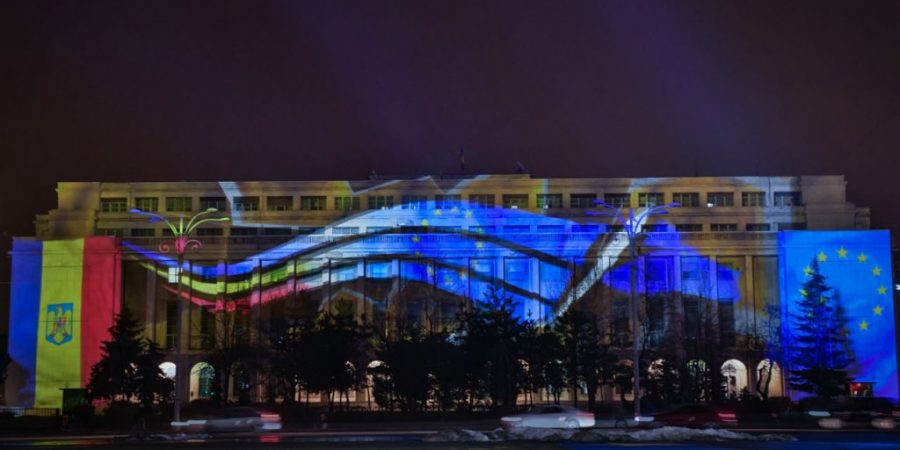Romania takes over rotating EU presidency

BRUSSELS, (DNA) – Romania took over the EU’s rotating presidency at a tumultuous time for the bloc. Romania will be in charge for the next six months as the European Union faces a series of tricky tests – most notably Brexit, European parliamentary elections, and wrangling over the next budget.
The Eastern European nation, which takes the presidency for the first time as it succeeds Austria, has been one of the EU’s important countries.
The Romanian Presidency of the Council of the European Union will aim to bring a contribution to ensuring convergence and cohesion in Europe, in order to achieve sustainable and equal development opportunities for all citizens and Member States, through increasing competiveness and reducing development gaps, promoting connectivity and digitalization, stimulating entrepreneurship and consolidating the European industrial policy.
Main objectives and priorities of the Romanian Presidency
Taking forward the negotiation process on the 2021-2027 Multiannual Financial Framework.
developing the EU social dimension, through the enforcement of the European Pillar of Social Rights.
advancing the EU agenda in the economic and financial fields, in order to stimulate growth and investment, to deepen the Economic and Monetary Union, as well as to support structural reforms.
promoting research and innovation, digitalization and connectivity, in order to increase the competitiveness of the European economy and industry.
The Romanian Presidency of the Council of the European Union will aim at consolidating a safer Europe through increased cohesion among EU Member States in dealing with the new security challenges that threaten the safety of citizens and through supporting the cooperation initiatives in the field.
Strengthening the internal security, by boosting cooperation among Member States and increasing the interoperability of the EU security systems, protecting the safety of the citizens, companies and public institutions in the cyberspace and improving the overall resilience of the Union to cyber-attacks.
=continuing the fight against terrorism
=facilitating the operationalization of the European Public Prosecutor’s Office.
=giving further attention to migration issues, based on a comprehensive approach to action within the EU and on promoting cooperation with countries of origin and transit, as well as facilitating the dialogue among Member States with a view to finding solutions for an effective and sustainable EU migration and asylum policy.
promoting the strengthening of EU’s defence and security capabilities in strong connection with the similar processes within NATO, with a special emphasis on consolidating the Strategic EU-NATO Partnership.
supporting further development of actions in the field of Common Security and Defence Policy, mainly by consolidating the current mechanisms while ensuring the synergy of the new instruments, such as: Coordinated Annual Review on Defence, European Defence Fund, and Permanent Structured Cooperation.
advancing the enlargement process of the EU in order to ensure more internal and external security.
promoting coordinated and coherent actions in the EU’s neighbourhood, while celebrating 10 years since the launch of the Eastern Partnership, through reaffirming the importance of the Black Sea on EU agenda, including from the perspective of reinvigorating the Black Sea Synergy.
promoting the European commercial interests through both the consolidation of multilateralism and the modernisation of the multilateral trade system and through the enlargement of the Economic and Free Trade Partnership Agreements.
promoting the efficient countering of racism, intolerance, xenophobia, populism, antisemitism and discouraging hate speech.
promoting the countering of online misinformation and fake news through better media literacy and the development of European mechanisms to share good practices in countering misinformation.
promoting and supporting the legislative initiatives focusing on social progress and reducing development gaps, equal opportunities between men and women,as well as ensuring access to education and training for disadvantaged categories.
countering gender discrimination in the labour market and business environment as well as the pay gaps between men and women.
Related News

The long slow death of Norway’s wild salmon
Hegra, Norway, July 9 (AFP/APP):Waist-deep in a rain-swollen river, Christer Kristoffersen cast his line, landedRead More

Thailand Lights Up Lahore and Islamabad: Film and Water Festival Events Strengthen Thai–Pakistani Friendship Through Culture and Soft Power
ISLAMABAD & LAHORE, JULY 9 (DNA): The Royal Thai Embassy in Islamabad recently brought theRead More


Comments are Closed